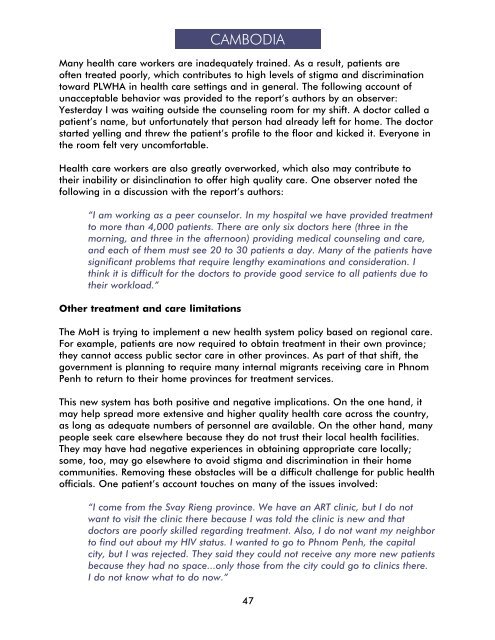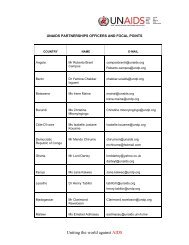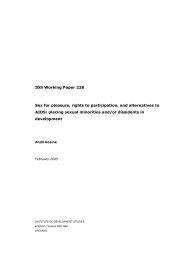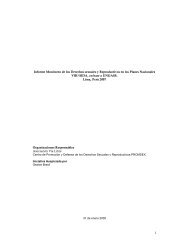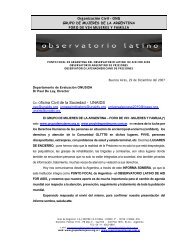Missing the Target #5: Improving AIDS Drug Access ... - CD8 T cells
Missing the Target #5: Improving AIDS Drug Access ... - CD8 T cells
Missing the Target #5: Improving AIDS Drug Access ... - CD8 T cells
Create successful ePaper yourself
Turn your PDF publications into a flip-book with our unique Google optimized e-Paper software.
Many health care workers are inadequately trained. As a result, patients areoften treated poorly, which contributes to high levels of stigma and discriminationtoward PLWHA in health care settings and in general. The following account ofunacceptable behavior was provided to <strong>the</strong> report’s authors by an observer:Yesterday I was waiting outside <strong>the</strong> counseling room for my shift. A doctor called apatient’s name, but unfortunately that person had already left for home. The doctorstarted yelling and threw <strong>the</strong> patient’s profile to <strong>the</strong> floor and kicked it. Everyone in<strong>the</strong> room felt very uncomfortable.Health care workers are also greatly overworked, which also may contribute to<strong>the</strong>ir inability or disinclination to offer high quality care. One observer noted <strong>the</strong>following in a discussion with <strong>the</strong> report’s authors:“I am working as a peer counselor. In my hospital we have provided treatmentto more than 4,000 patients. There are only six doctors here (three in <strong>the</strong>morning, and three in <strong>the</strong> afternoon) providing medical counseling and care,and each of <strong>the</strong>m must see 20 to 30 patients a day. Many of <strong>the</strong> patients havesignificant problems that require lengthy examinations and consideration. Ithink it is difficult for <strong>the</strong> doctors to provide good service to all patients due to<strong>the</strong>ir workload.”O<strong>the</strong>r treatment and care limitationsCAMBODIAThe MoH is trying to implement a new health system policy based on regional care.For example, patients are now required to obtain treatment in <strong>the</strong>ir own province;<strong>the</strong>y cannot access public sector care in o<strong>the</strong>r provinces. As part of that shift, <strong>the</strong>government is planning to require many internal migrants receiving care in PhnomPenh to return to <strong>the</strong>ir home provinces for treatment services.This new system has both positive and negative implications. On <strong>the</strong> one hand, itmay help spread more extensive and higher quality health care across <strong>the</strong> country,as long as adequate numbers of personnel are available. On <strong>the</strong> o<strong>the</strong>r hand, manypeople seek care elsewhere because <strong>the</strong>y do not trust <strong>the</strong>ir local health facilities.They may have had negative experiences in obtaining appropriate care locally;some, too, may go elsewhere to avoid stigma and discrimination in <strong>the</strong>ir homecommunities. Removing <strong>the</strong>se obstacles will be a difficult challenge for public healthofficials. One patient’s account touches on many of <strong>the</strong> issues involved:“I come from <strong>the</strong> Svay Rieng province. We have an ART clinic, but I do notwant to visit <strong>the</strong> clinic <strong>the</strong>re because I was told <strong>the</strong> clinic is new and thatdoctors are poorly skilled regarding treatment. Also, I do not want my neighborto find out about my HIV status. I wanted to go to Phnom Penh, <strong>the</strong> capitalcity, but I was rejected. They said <strong>the</strong>y could not receive any more new patientsbecause <strong>the</strong>y had no space...only those from <strong>the</strong> city could go to clinics <strong>the</strong>re.I do not know what to do now.”47


